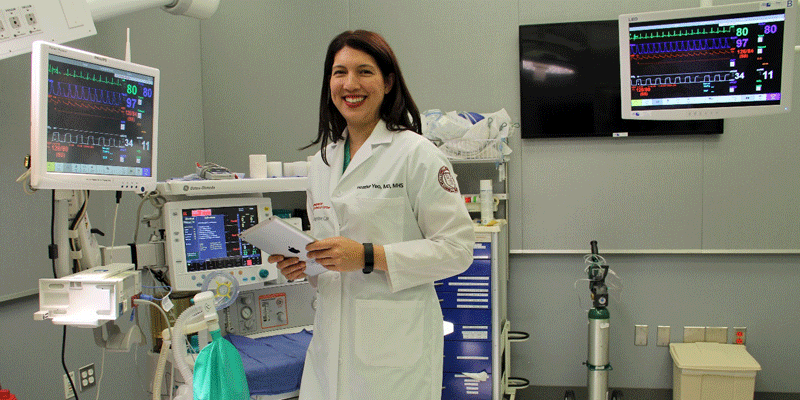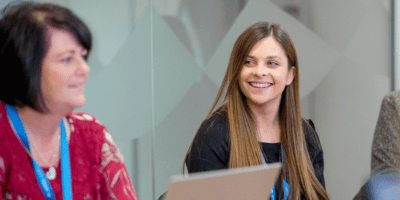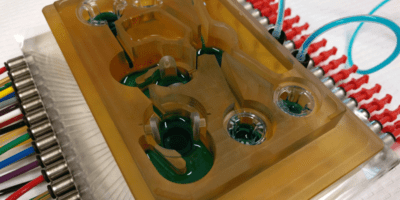Dr. Heather Yeo is Assistant Professor of Surgery and Assistant Professor of Public Health at Weill Cornell Medical College and Assistant Attending Surgeon at New York-Presbyterian / Weill Cornell Medical Center and she is a colon and rectal surgeon, and also a surgical oncologist based in New York. She sits on the committee of the Association of Women Surgeons (AWS), a not-for-profit educational and professional organisation founded in 1981. Today AWS has over 1,800 members in 21 countries, with its activities dedicated to enhancing the interaction and exchange of information between women surgeons.
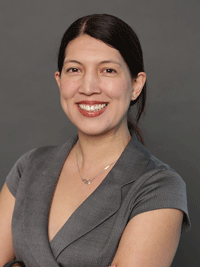
“…whilst it is hard and there are challenges all along the way, there are people at each point who are willing to help you. I would say that no one can do it alone…”
Becoming a surgeon
I am Assistant Professor of Surgery and Assistant Professor of Public Health at Weill Cornell Medical College and Assistant Attending Surgeon at New York-Presbyterian / Weill Cornell Medical Center. I am board-certified in general surgery, colon and rectal surgery and complex general surgical oncology. I am focused on surgical outcomes and quality improvement in gastrointestinal cancer surgery.
Whilst I was a fellow at Memorial Sloan Kettering Cancer Center, I worked to understand bowel function and quality of life in rectal cancer patients who have undergone sphincter preserving surgery and studied ways to improve their quality of life. Most recently my work has been focused on cancer surgery in aging populations, looking at outcomes, predictors of poor outcomes and possible ways to improve them.
Developing a mobile app to track patient progress
I am particularly interested in the psychosocial factors that go into surgical decision making and how they influence outcomes in an aging population. In addition I have been working with Cornell Tech to develop mobile apps to track patients in the perioperative period.
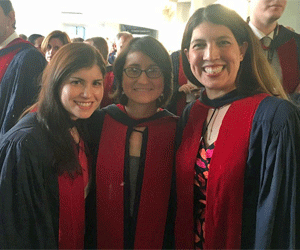
NEARS (National study of Expectations and Attitudes of Residents in Surgery) was the first study of its size and aimed to understand what it is like for residents as they train to be surgeons. I then returned to complete my surgical residency from 2008-2011.
After completing my surgical residency, I moved to New York City where I completed two fellowships, one in Complex General Surgical Oncology at Memorial Sloan Kettering Cancer Center and a second in Colon and Rectal Surgery at New York-Presbyterian / Weill Cornell Medical Center / Memorial Sloan Kettering Cancer Center. Upon completion, I joined the faculty at Cornell in January of 2014. For the past few years I have been working to develop several projects focused on the older adult undergoing GI [gastrointestinal] cancer surgery and have worked with Cornell Tech to create and pilot my mobile app.
The app is iPhone and Android compatable. It is dubbed mHEALS (mobile app Helping Engage AduLts after Surgery) – it tracks and sends patients’ health information to doctors, as well as generating reminders to help patients stick to their aftercare regimens. I am currently completing a pilot funded by the Damon Runyon Cancer Research Foundation to perform a randomised controlled trial using the app.
The privilege of taking care of patients instilled in me from both my parents
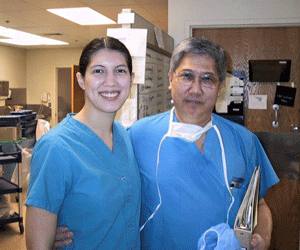
The privilege of taking care of patients is one that my parents instilled in me. My father, a community general surgeon, passed away 12 years ago this past May – just weeks before I started my surgery residency. I was inspired by the impact he made on his patients and how he changed their lives. My mother, a nurse, is one of the kindest people I have ever met. Together I have learned from them and become a physician interested not only in making a difference for my individual patients, but on a larger scale. I am proud of what I have accomplished and look forward to becoming a leader in the field of surgical oncology and colon and rectal oncology, and I’m honoured to be able to care for these complex patients.
I did not always know that I wanted to go into surgery, and in fact my undergraduate major was from the Georgetown’s School of Foreign Service, with a focus on science and technology in international affairs. After taking some science classes, I decided that I wanted to go into medicine, so I switched gears a little bit after I graduated, and I went back to school and took premed courses.
I liked surgery because it is a very direct way to help people and because of the relationship you build with your patients. That is one of the reasons my focus is on colon cancer; a disease that can only be cured with the help of surgery, but one where patients often have good survival.
A day in the life of a surgeon
I’m very lucky. I work with a great team of surgeons (men and women), nurses and support staff. Every day I spend some time on patient care, I operate around one day a week and cover emergency surgery one day a week. I also spend time a large portion of my time researching ways to improve the way that we care for surgical patients.
I have a joint appointment in our Department of Healthcare Policy and Research where I spend time as a health services researcher studying surgical outcomes. I am also working with Cornell’s Tech campus to develop post-operative patient tracking apps. Days are long and busy, but usually go by quickly because of this, usually starting at 6am, with morning rounds, followed by meetings, then surgery, clinic or research. And as a working mom, my evenings are devoted to my kids (until they fall asleep) and often work again once they are asleep for the night.
The Association of Women Surgeons – an important source of support for female surgeons around the world
I initially joined the Association of Women Surgeons because of the grant opportunities that they offer. After that I learned about other resources through the AWS and became more involved in both our local medical student group and on a national level.
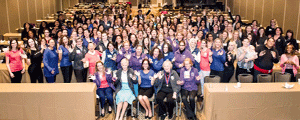
AWS’s goal is to help women surgeons engage, empower and excel. They offer mentorship, resources, and a community of women surgeons to help those all along the pipeline of training (from medical students to department chairs).
In addition AWS is involved internationally helping promote and support those in other countries where women are often not given opportunities. AWS is active politically and working to support policies that help engender equality. For example we support pay parity for women surgeons, and parental leave.
The Association of Women Surgeons was founded in 1981 when Patricia Numann, MD, FACS, invited as many women surgeons as she could identify to breakfast at the October meeting of the American College of Surgeons. Over the past 35 years AWS has grown from a mere handful of women who met informally once a year to an internationally recognised organisation with members in over 15 countries.
AWS has representation on the American College of Surgeons Board of Governors, the Editorial Board of the American Journal of Surgery and sponsors career development programmes at the Biennial Meeting of the International Society of Surgery.
Over the past three decades the AWS Foundation has provided concrete opportunities through our awards, fellowships, grants and visiting professor programmes to advance the careers and professional development of women surgeons. A considerable number of the women surgeons who have achieved significant leadership positions are AWS members, and owe their success in part to the mentorship, support and collegiality offered by other AWS members.
Gender balance in surgery: 121 years and counting
Women are still outnumbered in surgery. While medical schools are near 50% women, further along the pipeline of surgical training women are much more underrepresented. At the highest levels of academic surgery (full professors), based on the current rate of increase, we estimated in our recent paper published in the American Journal of Surgery that it will take women 121 years to reach gender parity. Some strides have been made recently, as now there are 17 female chairs of departments of surgery, many more than in the past.
MT @DrKathyHughes: #Gendergap in surgery; 121 yrs to parity w/ current trends. #ILookLikeASurgeon pic.twitter.com/D9LSgAynTB #AWS2016
— UW Surgery (@WiscSurgery) October 25, 2016
The importance of male champions
Male champions are making a huge difference. By supporting and promoting women our champions who are in power help us to get into power and enable our careers. Dr. Jeff Milsom, the chief of our division, is an innovator and wants to have innovative people around him, and he is willing to take risks to change the way that we care for patients. I find working with him inspiring.
Also, our chairman of surgery, Dr. Fabrizio Michelassi, has been a strong supporter of women surgeons and a diverse work force, even starting a diversity lecture series. He was awarded the Past Presidents’ Award this year at the AWS Annual Meeting, which is given to a surgeon who does a lot to support women surgeons and diversity. Our department has focused on learning the importance of unconscious bias.
So proud to be mentored by amazing @FMichelassiMD winner of @WomenSurgeons past prez award #ACSCC16 #AWS2016 pic.twitter.com/xisMTa95aE
— sharon stein (@slsteinmd1) October 18, 2016
Social media engagement
The AWS is very active on social media (Instagram, Facebook, Twitter and our blog – please follow us @womensurgeons). While we were not the creators of #ILookLikeASurgeon, many of those involved in starting it are members of our organisation, and like all social media that helps to further engage and empower women; we support any focus on enabling women surgeons.
Advice for other girls and women interested in surgical careers
My advice for other girls and women interested in surgery is to know that whilst it is hard and there are challenges all along the way, there are people at each point who are willing to help you. I would say that no one can do it alone.
I have a very supportive husband and family, mentors and colleagues all who have helped me along the way. The job is rewarding beyond belief, and the privilege of taking care of and operating on patients is really unlike anything else.
Getting strategic about the future for women in surgery
This past spring the entire AWS Council met to set goals for the next five to ten years. We created a strategic plan to help our members (academic and community, early career and late), we talked about important policy issues that we want to champion (such as pay parity and parental leave) and ways to move these things forward.
Over the next year, we are expanding our social media presence (we just created a members only Facebook page in order to help members network and answer questions in a more private environment) and our Instagram page just launched.
Sometimes just seeing that you are not alone in this process brings comfort. We just had our annual meeting where I met many amazing and inspiring women, and hopefully I provided inspiration for someone interested in surgery.
https://www.womensurgeons.org/
https://twitter.com/womensurgeons
https://twitter.com/heatheryeomd
https://www.facebook.com/womensurgeons
https://www.instagram.com/associationofwomensurgeons/

